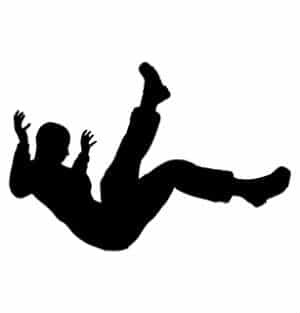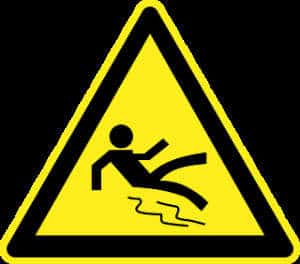If you are injured as a result of a slip and fall at a private residence, you may be able to file a lawsuit against the homeowner’s insurance policy or pursue legal action to receive compensation for your injuries. The National Floor Safety Institute states that slip and falls account for over one million emergency room visits per year. Since slip and falls are fairly common and usually result in some type of injury, it is important that you know the actions you should take should you find yourself the victim of a slip and fall accident.
Understanding The Premises Liability Law
Premises liability laws were put in place to determine if the homeowner was negligent in the event of a slip and fall accident. If you suffer from a slip and fall accident, the homeowner may be liable for any injuries you sustain. Likely, during such an event you were invited to the home by the homeowner. If there are any hazards, it is the responsibility of the homeowner to warn you of those hazards. It is also the homeowner’s responsibility to correct any potential hazards to protect you from injury. If the homeowner fails to warn you or correct the problem, then you may be entitled to compensation. If you trespass on someone’s property, that homeowner would not be liable for any injuries you sustain. However, if a child trespasses because they are attracted to a pool, trampoline or some other hazard, the homeowner could be liable for any injury caused to that child. Such dangers are called attractive nuisances because they easily draw a child’s attention. if your child is injured from a slip and fall accident, it is a good idea to consult with an experienced attorney.
Taking The Proper Steps After The Slip And Fall
When you are injured in someone’s home as a result of a slip and fall, keep in mind there are a few steps you need to take to ensure you will be able to file a claim. These steps include:
- Take photographs of the area where the slip and fall occurred.
- If any witnesses were present, ask for their contact information.
- Obtain the homeowner’s insurance information.
- If medical treatment is necessary, see a doctor as soon as possible.
- Keep a record of all medical costs.
You need to also remember after a slip and fall to avoid statements stating you are fine and that you don’t think you were injured. Although these seem like common responses after an accident, such phrases could be used against you by the defense attorney or the insurance company to downplay your injuries and ultimately result in you receiving less compensation than you deserve. When speaking with the insurance company, state only the facts. Do not give any information that is not requested.
Making A Claim Against A Homeowner
You must first determine if the homeowner has homeowner’s insurance. Most homeowners do have insurance. This is primarily because any home with a mortgage is required to have insurance. However, if a homeowner owns the home with no mortgage attached to the property, then it is possible there is no insurance. In any case, the only way to determine if insurance exists is to ask the property owner. Once you have the insurance information, report your injury to the insurance company as soon as possible. Because insurance companies often cancel homeowner’s insurance if even one claim is filed, many homeowners might be reluctant to file a claim. In this case, your only recourse is to sue the homeowner and demand the insurance information. This can create an awkward situation, especially if the property owner is a close associate, but you must protect yourself.
The Claim Process
A homeowner’s insurance claim works very similarly to that of an automobile insurance claim. You report your injury to the insurance company. The insurance company will then assign an insurance adjuster to your case. The adjuster will then contact the property owner and get their side of the story. Once they’ve talked to the homeowner, they will then contact you to hear what you have to say. You should keep in mind that the adjuster will try to get a recorded statement from you. You should refuse such a recording if you have no representation. You will need to provide to the adjuster medical bills, medical records, lost wages and any other documentation regarding your injury. The adjuster will try to settle your claim once you’ve finished treatment. If you cannot settle with the insurance company, you would need to file a lawsuit against the homeowner to pursue the compensation you feel you are entitled to.
Liability And Medical Payment Coverage
Homeowner’s insurance is comprised of two different types of insurance. These are liability coverage and medical payment coverage. Medical payment coverage will pay for a limited amount of your medical bills regardless of whether or not the homeowner was negligent. Most policies will pay $5,000 or $10,000 for medical bills. You simply submit your medical bills to the insurance adjuster. The bills will be paid on an ongoing basis. In order for liability insurance to cover your injury, there must be proof that the homeowner was negligent and such negligence contributed to your accident. Just because you fell on someone’s property does not make the homeowner automatically liable for your injuries. If you caused the hazard, such as spilling water on the floor and failing to wipe it up, and you slipped and fell, the homeowner would not be liable for such an accident and the insurance company would not be required to compensate you under the liability coverage.
Causes Of Residential Slip And Fall Accidents
There are many causes of residential slip and fall accidents. Some accidents can be caused by uneven flooring or the stairs. Rugs and carpets can be tripping hazards and cause many accidents. Floors can cause a slip and fall accident if they:
- contain area rugs that easily slide on the floor
- have carpets with holes
- are freshly waxed
- are wet
Staircase accidents are especially dangerous and often lead to injuries and sometimes those injuries are serious. Several factors can contribute to an accident on the stairs and they include:
- clutter or a foreign object in the stairs
- non-existent handrails or handrails that are poorly designed
- the height of the stairs are of varying height, either too high or too low
- rugs or carpeting on the stairs
While you hope to never be the victim of a slip and fall accident, there is always a risk. It can be an especially difficult situation to deal with if the homeowner is a friend, relative, neighbor or another close associate. However, your main priority should be to take care of yourself. If you were injured on someone’s property, then you must take the necessary steps to receive the compensation to cover your medical care and other related expenses. This can be a tricky process. You would be wise to seek the advice a legal expert that specializes in slip and fall accidents. Not only is filing the claim against the homeowner stressful but dealing with the insurance company can be equally daunting. They are representing the homeowner and they do not want to pay you anything at all. An experienced attorney can represent you so that you receive the maximum amount of compensation for your injury. If you’re injured in a slip and fall, don’t try to take care of it on your own. Contact an experienced attorney immediately.
